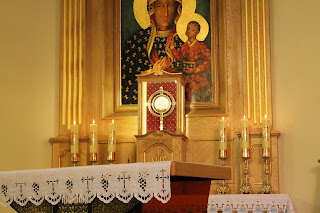In polish below... po polsku, poniżej...
Luke 10:25-37 |
|---|
The good Samaritan
Who is my neighbour, asked the Pharisee? This question has become the key thing of the Gospel. The commandment of love was the fundamental law for the Israel’s society, which was confirmed by Jesus and his teaching.
Christ responded to the question, using the parable of the good Samaritan. The parable is referring to the man who was kidnapped and kicking by the thieves, having been left for the certain dead. For that man was one chance to be rescued by someone. There were three people passing by, buy the only was occurred full of the sensitivity and care. The two were afraid of the religion impurity. The human regulation was more important than human help. The third one was the Samaritan, who for the Jews was enemy, belonging to the excluded nation, ignored completely.
That man become the real neighbour and brother for the dying man, because he gave him helpful hand and attention, rescuing his life.
The conclusion of the parable is that everyone is our neighbour, regardless of religion, background, country, and skin colour.
We should not reserve our help to those, who are friends or family.
I would like to give you a real story of a man, who was constantly considered as a problem for the society. He was in conflict against the law, police, and his own background. Nobody wanted his as friend.
One day he came to the local priest, asking; can I go with you and the group for a retreat. The priest said, this retreat is reserved for the parish group.
The young man responded, and do you want to reject me too? Afterwards, the priest was reflecting about his mistake, and took him for the retreat.
It was a good decision to do that. The young man has converted, changing his past life, becoming an honest man.
This man, who got the chance from the priest, he became a priest, serving to the Church and other people. Through the experience of his conversion, he found his vocation to the priesthood.
One helpful hand did so many. The local priest was the Samaritan for the young man, who found the sense of life, as the server of God.
We never know, but my attitude of help and sensitivity may rescue life of someone. Jesus said to the Pharisee, go and do the same. Let help other people, so. Amen.
Kim jest mój bliźni, zapytał faryzeusz? To pytanie stało się kluczową sprawą dzisiejszej Ewangelii. Przykazanie miłości było podstawowym prawem społeczeństwa izraelskiego, co zostało potwierdzone przez Jezusa i Jego nauczanie.
Chrystus na pytanie tego człowieka odpowiedział przypowieścią o dobrym Samarytaninie. Przypowieść odnosi się do człowieka, który został porwany i pobity przez złodziei, pozostawiony na pastwę śmierci. Dla tego człowieka była jedna szansa na uratowanie życia, przez przechodzących mężczyzn. Przechodziły trzy osoby, ten trzeci był pełny wrażliwości i troski. Dwaj pierwsi bali się nieczystości religijnej, uciekając od pomocy dla na półumarłego. Ludzka regulacja była ważniejsza niż ludzka pomoc. Trzecim był Samarytanin, który był dla Żydów wrogiem, należącym do narodu wykluczonego, całkowicie ignorowanego.
Ten człowiek stał się dla umierającego prawdziwym bliźnim i bratem, bo podał mu pomocną dłoń, ratując mu życie.
Konkluzja przypowieści jest taka, że każdy jest naszym bliźnim, bez względu na religię, pochodzenie, kraj i kolor skóry.
Nie powinniśmy rezerwować naszej pomocy dla tych, którzy są przyjaciółmi lub rodziną.
Chciałbym podzielić się jedną prawdziwą historią człowieka, który był stale uważany za problem dla społeczeństwa. Był w konflikcie z prawem, policją i własnym środowiskiem. Nikt nie chciał go za przyjaciela.
Pewnego dnia przyszedł on do miejscowego księdza z pytaniem; czy mogę pojechać z tobą i grupą na rekolekcje. Ksiądz powiedział, że te rekolekcje są zarezerwowane dla grupy parafialnej.
Młody człowiek odpowiedział i ty chcesz mnie odrzucić? Następnie ksiądz zauważył swój błąd i zabrał go na rekolekcje.
To była dobra decyzja. Młody człowiek nawrócił się, zmieniając swoje życie, stając się uczciwym człowiekiem.
Ten człowiek, który dostał szansę od księdza, został księdzem, służącym Kościołowi i innym ludziom. Poprzez doświadczenie swojego nawrócenia odnalazł powołanie do kapłaństwa.
Jedna pomocna ręka zrobiła tak wiele. Miejscowy ksiądz był Samarytaninem dla młodego człowieka, który odnalazł sens życia jako sługa Boży.
Nigdy nie wiadomo, ale moja postawa pomocy i wrażliwości może kogoś uratować. Jezus powiedział do faryzeusza, idź i czyń to samo. Czyńmy to samo. Amen.





